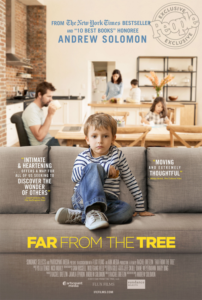Far from the Tree
Posted on August 2, 2018 at 5:39 pm
B +| Lowest Recommended Age: | Middle School |
| MPAA Rating: | Not rated |
| Profanity: | Mild language |
| Alcohol/ Drugs: | None |
| Violence/ Scariness: | Reference to a brutal murder, tense family situations, sad offscreen death |
| Diversity Issues: | A theme of the movie |
| Date Released to Theaters: | August 3, 2018 |

All parents at some point look at children and think, “Who is this and how did they get to be part of my family?” Children think that from time to time about their parents, too, especially when they get to their teens. “Far from the Tree,” based on the award-winning book by Andrew Solomon, is a documentary about the most extreme versions of that sense of disconnection. Solomon tells his own story about growing up gay and the incomprehension and rejection he experienced from his heterosexual parents, who exemplified the conventions of their era. But most of the focus of the film is on other families: Jason, a 41-year-old man with Down syndrome and the mother who worries about how he will manage when she is gone, a young woman and a married couple who are Little People, a teenager with autism who is finally able to communicate with his family, and the parents and siblings of a teenager who committed an unthinkable crime.
The movie raises questions about nature and nurture, about what “normal” means, and about the different but both vitally important feelings of connection and support we get from the families we are born into and the families we find because we understand each other. Loini Vivao, a Little Person in an affectionate but otherwise average-sized family, wonders, “Is there anybody out there like me?” When she attends her first annual Little People convention, her sense of wonder and acceptance is breathtaking. When she is invited to appear in the convention’s fashion show, she immediately demurs. She is too shy. But then we see her glowing as she owns the catwalk. One of the other attendees explains why this gathering is so important: “They come to be seen. And to disappear.” No one looks away or stares. When everyone is little, everyone is the right size.
That makes a conference room discussion among the organization’s leaders especially poignant. The topic is an experimental new drug that could “cure” some forms of dwarfism. Like the controversy over cochlear implants, this raises the question of whether dwarfism is something that needs to be “cured.” “I don’t think I need to be fixed,” says Leah Smith, who, with her husband, Assistant Professor of Philosophy Joseph Stramando, show us just how “normal” their lives are, casually using various work-arounds, from a wheelchair to a flip-flop sandal to push a hotel light switch.
Jason Kingsley’s parents wanted to prove the experts wrong, and they were successful, to a point. When Jason was born with Down syndrome, the doctor told the parents, “We send them away before attachment is formed.” But “you don’t write off a person because of the label that he wears,” his mother explains. With a lot of support, Jason became a literal poster child for people with Down syndrome, appearing on television to show that he was keeping pace academically. Jason has a job, delivering mail in an office. He lives with two other men with Down syndrome and they call themselves “The Three Musketeers.” It is not what his mother envisioned for him and she is concerned about his fragile understanding of the difference between fantasy and reality. He thinks if he can go to Norway, he can meet Elsa from “Frozen.”
The most astonishing moment in the film is when Jack Allnut, severely impaired with autism and seemingly unable to communicate or even understand what is being said to him, is given a chance to use an alphabet board. His first message is stunning. His mother says, “My God, he’s in there. It’s like I was meeting him for the first time.” And the saddest moment is the family of the teenager who committed a terrible crime. In a way, it was like they were meeting him for the first time. The family continues to love and support him, but his two siblings say they have decided never to have children.
They may change their minds. This movie is not so much about the family differences we have to surmount as it is about the imperishable love that sustains us. As Norman Mclean says in “The River Runs Through It,” “we can love completely without complete understanding.” The true greatness of families — and of humanity — is that we choose to do so.
Parents should know that this unrated film includes discussion of a brutal murder, pregnancy and miscarriage, disabilities, sex, sad offscreen deaths, and family tensions.
Family discussion: What makes you most like the rest of your family? What makes you different? Who is your tribe?
If you like this, try: “A Kid Like Jake” and the book by Andrew Solomon
